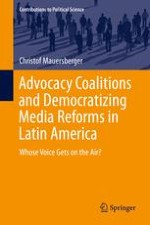2016 | OriginalPaper | Buchkapitel
6. Broadening the Scope: Advocacy Coalitions and Media Reforms in Chile and Uruguay
verfasst von : Christof Mauersberger
Erschienen in: Advocacy Coalitions and Democratizing Media Reforms in Latin America
Aktivieren Sie unsere intelligente Suche, um passende Fachinhalte oder Patente zu finden.
Wählen Sie Textabschnitte aus um mit Künstlicher Intelligenz passenden Patente zu finden. powered by
Markieren Sie Textabschnitte, um KI-gestützt weitere passende Inhalte zu finden. powered by
